West Point Cheating Scandal Worst in Decades
73 cadets violated the honor code while taking an exam remotely.
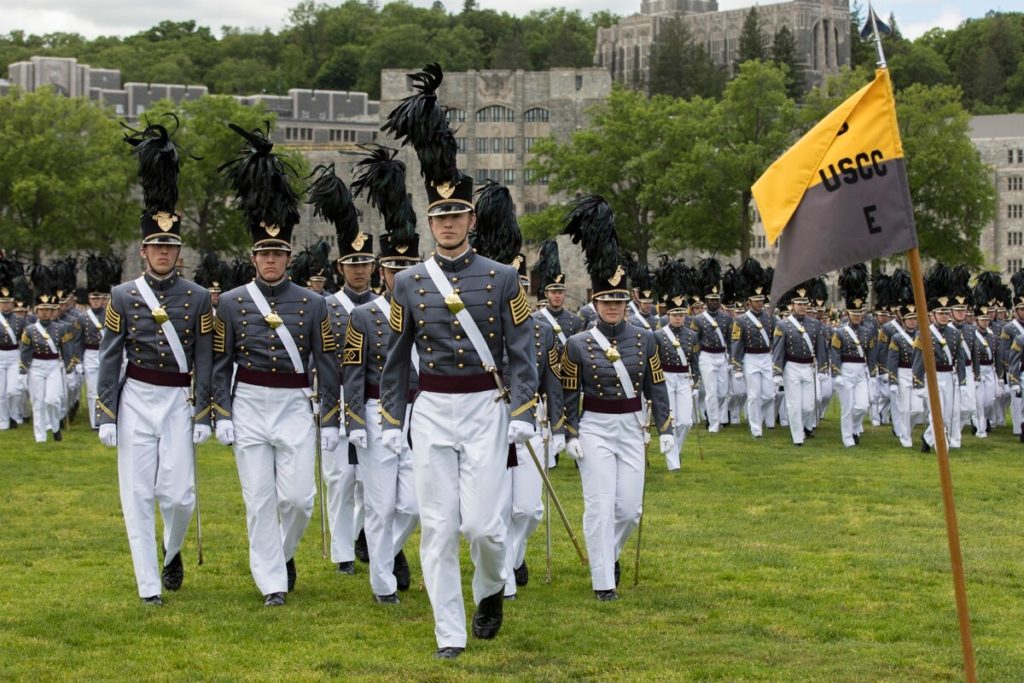
USA Today (“West Point accuses more than 70 cadets of cheating in worst academic scandal in nearly 45 years“):
More than 70 cadets at the U.S. Military Academy at West Point were accused of cheating on a math exam, the worst academic scandal since the 1970s at the Army’s premier training ground for officers.
Fifty-eight cadets admitted cheating on the exam, which was administered remotely because of the COVID-19 pandemic. Most of them have been enrolled in a rehabilitation program and will be on probation for the remainder of their time at the academy. Others resigned, and some face hearings that could result in their expulsion.
The scandal strikes at the heart of the academy’s reputation for rectitude, espoused by its own moral code, which is literally etched in stone:
“A cadet will not lie, cheat, steal, or tolerate those who do.”
Tim Bakken, a law professor at West Point, called the scandal a national security issue. West Point cadets become senior leaders the nation depends on. “There’s no excuse for cheating when the fundamental code for cadets is that they should not lie, cheat or steal,” Bakken said. “Therefore when the military tries to downplay effects of cheating at the academy, we’re really downplaying the effects on the military as a whole. We rely on the military to tell us honestly when we should fight wars, and when we can win them.”
Army Secretary Ryan McCarthy said West Point’s disciplinary system is effective.
“The Honor process is working as expected and cadets will be held accountable for breaking the code,” McCarthy said in a statement.
“The honor system at West Point is strong and working as designed,” Lt. Gen. Darryl Williams, the academy’s superintendent, said in a statement. “We made a deliberate decision to uphold our academic standards during the pandemic. We are holding cadets to those standards.”
Army Col. Mark Weathers, West Point’s chief of staff, said in an interview Monday that he was “disappointed” in the cadets for cheating, but he did not consider the incident a serious breach of the code. It would not have occurred if the cadets had taken the exam on campus, he said.
Rep. Jackie Speier, D-Calif., who leads the personnel panel of the House Armed Services Committee, said she found the scandal deeply troubling and West Point must provide more transparency to determine the scope of cheating.
“Our West Point cadets are the cream of the crop and are expected to demonstrate unimpeachable character and integrity,” Speier said. “They must be held to the same high standard during remote learning as in-person.”
Instructors initially determined that 72 plebes, or first-year cadets, and one yearling, or second-year cadet, had cheated on a calculus final exam in May. Those cadets all made the same error on a portion of the exam.
Recently concluded investigations and preliminary hearings for the cadets resulted in two cases being dismissed for lack of evidence and four dropped because the cadets resigned. Of the remaining 67 cases, 55 cadets were found in violation of the honor code and enrolled in a program for rehabilitation Dec. 9. Three more cadets admitted cheating but were not eligible to enroll in what is called the Willful Admission Program.
The scandal of 1976 was much larger and created a revamping of the whole honor code, including the present policy that allows those found guilty of cheating to rehabilitate. There, the Academy went through self-reflection and decided that its training practices and means of dealing with infractions were partially to blame.
That 73 cadets were caught cheating on a single exam is a big deal. On the other hand, it’s worth emphasizing that 72 of them were in their first year. And the Class of 2023 had “more than 1,190” members, so we’re talking about 6 percent of the cohort.
Still, I agree with Speier that it’s distressing for the Superintendent to downplay this. The fact that this “would not have occurred if the cadets had taken the exam on campus” speaks to procedure, to be sure, but it also speaks to integrity. “They cheated because they thought could get away with it” is the antithesis of honor. If “Duty is doing the right thing when no one is watching,” these 73 are derelict.
On the other hand, Bakken is being histrionic. We’re talking about 18- and 19-year-old kids operating under unusual stress—forced back home during a pandemic and trying to complete their studies remotely—not senior leaders. They deserve additional scrutiny—and redoubled honor education—during the rest of their tenure at the Academy but it’s likely an overreaction to simply expel them, permanently branding them cheaters.
Further, while it’s true that the academies pride themselves on producing the best of the best, the fact of the matter is that these cadets are under a far higher level of scrutiny than their ROTC peers. There is doubtless cheating there, too, but it never rises to the level of scandal because it’s either undetected or the cadets are simply quietly dismissed from the program. Academy cadets are technically active duty soldiers, subject to not only 24/7/365 supervision but the Uniform Code of Military Justice.

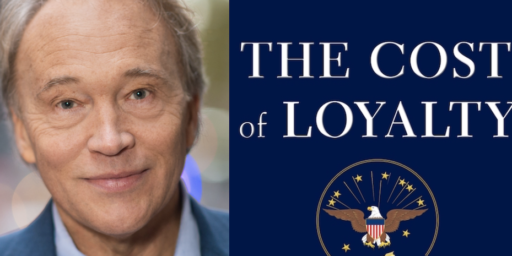
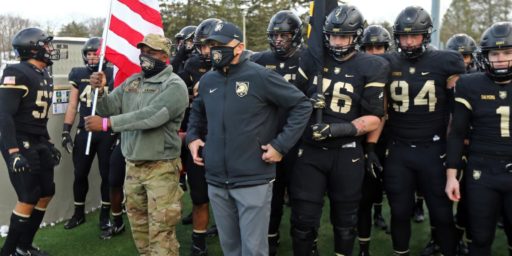
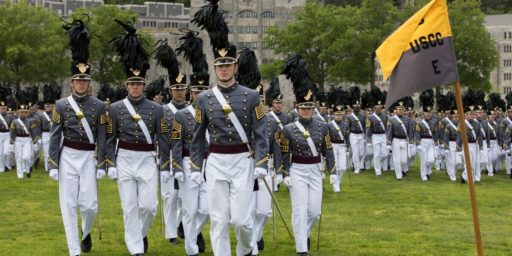

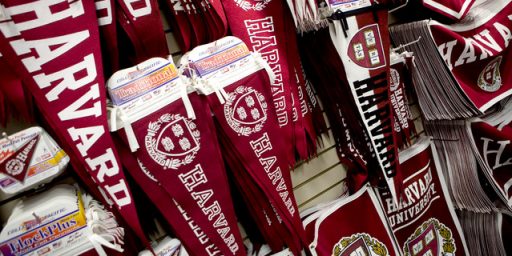
I guess that creed goes by the way when one is no longer a cadet.
Really, is it any wonder we see stuff like this, given the example the Commander-in-Chief sets?
I wonder if someone planted the cheat sheet just to tempt the weaker cadets.
Ive said on this blog before that Zero-Defect culture produces poor leadership over the long run. I wouldn’t have downplayed the violation nor considered dismissal. But I would have made their lives a living hell for the next year with restrictions, extra PT, etc.
They can be walking advertising at West Point for why to take the honor code seriously.
As a side issue, it wont happen but we really need to evaluate the relevancy of the Service Academies. They are not producing more high caliber officers than ROTC programs IMO. I actually think the diverse experience of the ROTC kids makes them adaptable to a whole lot more leadership situations than the Academy kids.
Ive hob-nobbed with many graduates of all of the Academies and they have a few smart ones, a few dumb ones, and a lot of regular ones in between…just like most other schools.
The only advantage the Academy kids have is up until O3 when they are a little better adjusted to a military environment than ROTC kids…after that the advantage was gone.
BTW..I was neither so no bias here. I came (non prior Enlisted) through Officer Candidate School
Sad. That’s all I’ve got, it’s sad.
They wouldn’t have cheated if it were harder. That’s a ringing endorsement. And it’s not 6% of the cohort who cheated, it’s 6% who got caught.
@Jim Brown 32: With the notable exception of the Marine Corps, academy graduates represent the lion’s share of generals and admirals, though. The percentages of GOFOs who are academy grads:
Air Force 41
Navy 39
Army 31
Marines 15
And it’s way higher for 0-9 and 0-10:
Navy 60
Air Force 52
Army 52
Marines 14
@gVOR08: Right. We have no idea about ones who didn’t get caught. But, clearly, the ones who did memorized the same exam.
Considering how much the military leans Republican, is this any surprise? Republicans lie constantly, about everything, yet somehow the Cadets are supposed to come away with the lesson that lying and cheater are bad things?
James: “We’re talking about 18- and 19-year-old kids operating under unusual stress—forced back home during a pandemic and trying to complete their studies remotely—not senior leaders.”
Yeah, it’s not like they were in, ya know, a war zone or something. They were safe and secure with their families all around them. Gosh, how did they bear up under the strain?
Let’s say they get some kind of punishment for this but don’t get bounced. What kind of senior leaders will they become? How will their non-cheating peers regard them for the rest of their time at West Point? How are troops expected to trust them in a battle situation? And if they’re not named but just allowed to remain, how does that not tarnish the entire year of cadets?
West Point can’t have it both ways: pointing with pride to the moral code and then saying, hey, no biggie, when it gets violated. Pick a lane, guys.
The most famous American ever to rise to the level of admiral cheated his way through the Academy. I refer of course to Admiral James T. Kirk, who defeated the Kobayashi Maru test by reprogramming the computer.
@Mikey: That was my immediate mental reaction as well upon reading that line in the post.
@Michael Reynolds: Come now, it had the advantage of never having been tried.
I can’t wait for the attempts to somehow blame this on “liberals.”
I think I agree with your assessment James, but we are paying for these guys education. Seems like there ought to be more than “more honor classes” or more PT. I was both enlisted and an officer. I am 99% sure that if some enlisted guys got caught cheating on advancement tests there would be a real financial penalty of some sort. (That was all a long time ago but I vaguely remember that happening, guys getting a fine and demotion.)
Full disclosure, I participated in a cheating scheme, at the age of 17, in boot camp. We had an alcoholic CPO (Navy) and our boot camp company was awful. Daily fights and weekly mini-race riots. Anyway, Chief said if we didnt win at least one company flag we would regret it. So we figured out a way to cheat on our exam. It worked and no one fessed up. Everyone knew we had to have been cheating when our average test score went up by 25% for that one test but they couldn’t prove it. In retrospect that was probably not honorable on our part, but we really weren’t equipped to deal with a tyrant drunk. And, it was kind of challenging and sort of fun in a sick kind of way.
Steve
@James Joyner:
I think Jim is right here. That academy grads make up the lion’s share of GO’s is mostly a function of various biases in the system that give academy grads advantages in assignments and promotions. I think it’s also true (at least it’s true in the Air Force) that academy grads tend to be more career-oriented. All current GO’s, for example, were commissioned at a time when academy grads got regular commissions and ROTC grads got reserve commissions that came with real limitations. Even today in the Air Force academy grads get priority for training slots, especially pilots, and first assignments. That gives them an early starting advantage.
In my time in the Navy and Air Force I served with and under a lot of outstanding officers and also a lot of turds. My impression is that academy grads were not inherently better as a cohort.
I currently live near the Air Force Academy and have some close friends who teach there. Our family also sponsors several cadets. This type of cheating scandal at West Point happens at USAFA practically every year. The zero-defect honor system there stopped about 5 or 6 years ago and now cadets get 2nd and sometimes even 3rd chances.
Personally, I’m a big fan of 2nd chances and am deeply skeptical of the zero-defect mentality that began in the military in the 1990’s. People should be given the opportunity to make mistakes and be able to learn from them (depending on the severity of the mistake, of course).
Oh, and stand by for something from the naval academy.
As a young assistant professor at a civilian school, I found I didn’t care about cheating much. I was there to teach them things, and if they didn’t care to learn it, that was on them. In computing, their knowledge, or lack of it, would become readily apparent quickly.
I’m not so sure that’s true for military officers. It seems more that if you cheated your way through and didn’t learn the stuff you needed to know, you were likely to fail at a very critical moment, and let down your comrades and your country.
But then, I don’t know anything about being in the military, you guys know better than me. Maybe the officers that cheated their way through become obvious long before that.
Anyway, I also think that these are young people, and still quite impressionable, and that this is an opportunity to make a lasting impression on them – rather than dismissing them. I am utterly unqualified to opine on the precise details.
Jay- I don’t think it is so much a matter of learning as it is character. Trust me, most of those guys will never use calculus at work. Lots of them will have to make decisions where character matters. Do we want officers who choose the easy but dishonorable way to do things?
Steve
I guess this comes from someone that went to a school with real teeth to their honor code, but, screw em. These are people who had to score damn near the top of their classes and be connected enough to get a recommendation from an elected official. They should be held to at least as high a standard as a kid from podunk appalachia attending a small liberal arts school in central Virginia. My old school’s honor court would have bounced them without a second’s hesitation and suspended for 1 to 3 semesters with a requirement to reapply to return, if not also kicked, anyone that knew about it and didn’t come forward to report it. We were made aware of the repercussions of an honor court violation from the first recruitment brochures, until the last exam we took. I can still recite from memory the statement we had to put at the end of every assignment, quiz, and exam over 20 years later: “On my honor I have neither given not received any aid on this work, nor do I know of any infraction of the honor code I shall not immediately report”.
Thank you for saving me the trouble of making this point.
When I was a young assistant professor in the early 90s, I caught a large portion of my sophomore engineering class cheating on a project. (All of their computer programs had the same typo, and many of them had been disguised by search-and-replace of variable names.)
I was horrified by the cheating, but I was even more horrified by how anxious my department and the Dean were to sweep the whole thing under the rug. This was a top 15 department (undergrad) in that field. It left a really bad taste in my mouth.
One time in junior high school, an enterprising classmate wrote down several answers to a biology quiz on the blackboard, in Hebrew letters, with a prominent “please do not erase” note in Spanish on top.
All the class could read it, and the teacher thought it was something left over from the prior period. She caught on when an abnormally large number of tests came out with high marks.